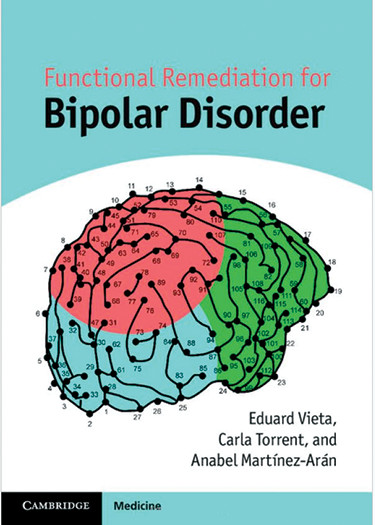As readers of the
Journal in recent years will know, bipolar disorder is more than a mood disorder. Contrary to what has been previously thought, disturbances of attention and deficits in memory and executive function persist even when euthymia has been achieved. Therefore, it is now proposed that bipolar disorder, in addition to being a mood disorder, also has a fundamental neurocognitive component (
1,
2). It is this state of affairs that the authors, themselves distinguished investigators from the Bipolar Disorders Program at Barcelona, have addressed in this book.
The book consists of four chapters and two appendices. The first two chapters review cognition and functioning in bipolar disorder and cognitive remediation in psychiatric disorders, primarily schizophrenia. Some of the descriptions of efforts in reducing patients’ frustration and confusion will remind us of Goldstein’s observations and treatment of “catastrophic reactions” in brain-damaged soldiers during World War I (
3).
The meat of this book lies in the fourth chapter, a manual that lays out the Functional Remediation Program, the efficacy of which has already been demonstrated (
4). Every clinician who treats bipolar patients will benefit by a close reading of this chapter. It is a systematic description of the 21 group sessions of the treatment program. While not possible to do justice to the manual in a few words, I might say that it first focuses on educating family members and patients about the objectives of treatment; then discusses factors that may affect impairment; and finally shows therapists how to help patients with problems of attention, memory, reading, executive functions (planning, managing time, establishing priorities), communication, interpersonal relationships, and stress. The session-by-session conduct of the treatment is presented through concrete examples. Samples of slides that are used in the sessions are included. PowerPoint slides and other materials used in the sessions are made available online. The sessions are designed for a group format, but, with modification, they can be adapted by clinicians for work with individual patients. This is a complete “how-to-do-it” manual introduced by two scholarly chapters on cognition in bipolar disorder and cognitive remediation in psychiatric disorders.
Reading this remarkable book will not be easy for many clinicians. It entails a close study of the theoretical chapters as necessary for a full understanding of the therapeutic program of the manual. The manual itself may seem dry unless one applies its precepts to thinking about a specific patient. However, the work is worth it. Many clinicians have grown accustomed to paying attention only to the disordered mood of their patients. When stable and euthymic, we often think of further recovery of social function as merely a matter of time. Our thoughts are primarily of medication selection. We may mistake remission of the mood disorder for cure.
This book further challenges us to think about the nature of psychiatric illness, current diagnostic nomenclature, and therapeutics. If the neurocognitive defects in schizophrenia, bipolar disorder, and other psychotic conditions are more similar than different, what does that say about the ultimate etiology of these disorders, the nature of clinical diagnosis, and the treatment that derives from diagnosis? Moreover, it is centrally important that a fundamentally psychotherapeutic series of techniques can influence brain function and thereby social function. In an era when physicians are asked to spend less and less time with patients, the findings and treatment recommendations of the authors of this book stand in stark contrast.


